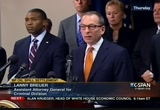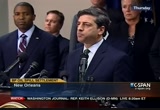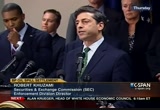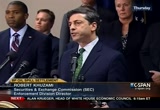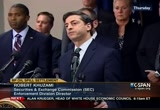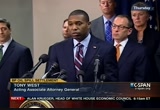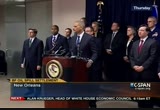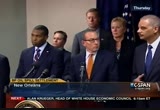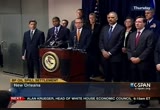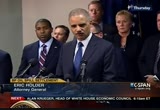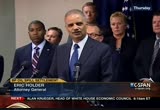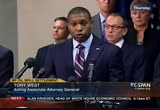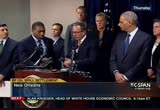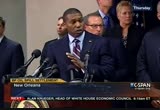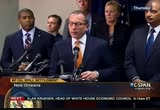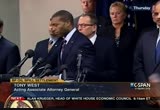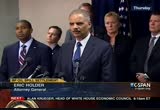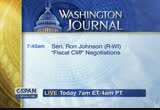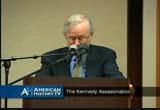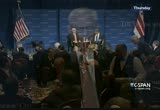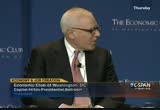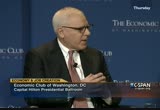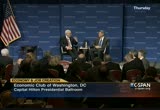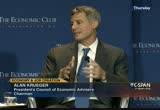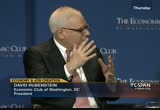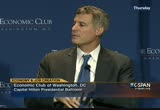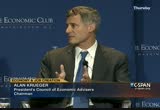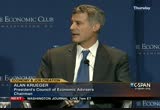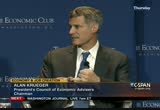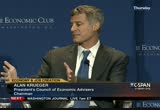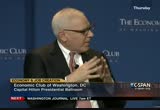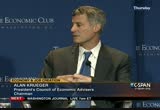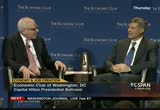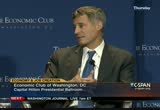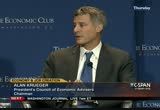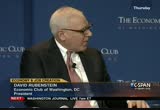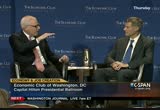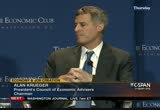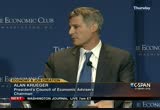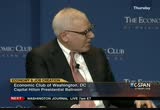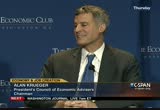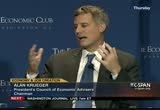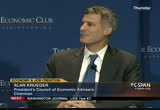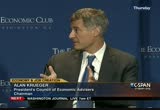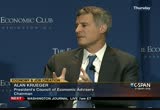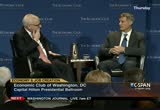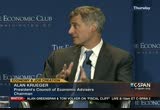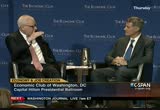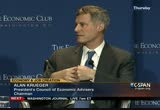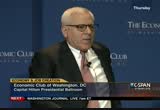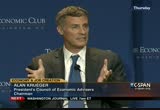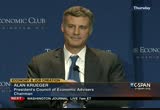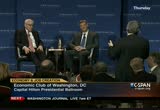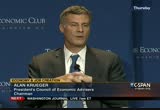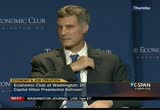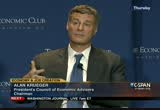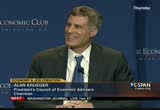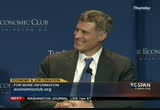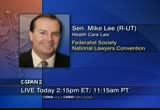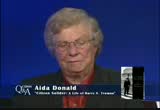tv Capitol Hill Hearings CSPAN November 16, 2012 6:00am-7:00am EST
6:00 am
for this horrible tragedy. today we've begun doing exactly that and tomorrow and in the months to come the deep water horizon task force will continue to tire leslie pursue justice in this matter. for this horrible tragedy. i'd like to personally thank task force director john beretta who has done an absolutely remarkable job in leading this investigation as well as the many fine prosecutors from the criminal division, the environment and natural resources division, the u.s. attorney community and the many talented federal and state law enforcement agents who have worked so hard for so long to develop these cases. i would like to thank our colleagues at the securities and exchange commission for their important parallel investigation. with that i would like to turn it over now to my friend and colleague, the director of enforcement at the f.c.c.
6:01 am
thank you. >> thank you. i'm director of enforcement at the f.c.c. today we are announcing that b.p. has agreed to pay more than a half billion dollars that it misled investigators about the rate of oil flowing during the deep water horizon disaster. the $525 million penalty represents the third largest civil penalty ever assessed and those funds will be used to compensate harmed investors for losses sustained from this fraud. b.p. misrepresented in f.c.c. filings that the oil spill flow rate was estimated to be up to 5,000 barrels of oil per day and that was the current estimate. in fact b.p. was in position of numerous analysis where 5,000 was at the lowest end of the range and those same analysis had upper ranges that were many multiples of 5,000 barrels. according to our complaint b.p. executives made public
6:02 am
statements in which they stood behind the flow rate of 5,000 barrels despite an ever growing body of evidence that the estimate was unreasonably low. they dismissed higher estimates reached by third party scientist and they realized it was nearly ten times the amount that b.p. estimated. the spill and concealment of the truth by b.p. caused devastating loss to the victims and environment and under mined the truth seeking function of congress. and by hiding the severity of the spill b.p. caused another type of harm that is our focus. harm to the shareholders, to the investing public and market all of which are entitled to transparent and complete and accurate information. the eyes of the world were on
6:03 am
b.p. in the spring and summer of 2010, the company had an opportunity to provide accurate disclosure about the facts needed by the public to make informed decision about investment and they chose to mislead the public. that is not what we expect from public companies and their management and it is in times of congress the need for accurate information is most acute. i want to recognize the hard work of the f.c.c. staff that conducted this investigation including brian thomas and mat ralph. they are the kind of public servants that americans can be proud of. i want to thank the members of the deep water horizon task force. and i want to thank the leadership of the department of justice, the attorney general, associate attorney general for their leadership in this investigation.
6:05 am
6:06 am
>> what does this settlement mean for the families of those who died and for all of those who have been impacted by this oil spill? >> those lives are irreplaceable and there is nothing we can do to bring those loved ones back. on the other hand this is an indication and perhaps a vindication that we have shown and the company has admitted that as a result of their actions people died there unnecessarily, manslaughter. manslaughter has been charged and manslaughter has been pled to. i would hope that would bring some degree of comfort by way of explanation as to why those brave people lost their lives. but at the end of the day, we can't bring them back and i think what we can certainly glean from what has happened here in terms of what we have charged and what the company pled to is those deaths were
6:07 am
unnecessary. >> are any of those fines tax deductible? >> they are not. the attorney general was clear that nothing in the criminal settlement could be tax deductible nor an offset to any further civil resolution and that was a very explicit term of the agreement at the request of the attorney general. >> mr. attorney general you said the criminal investigation is ongoing s. that possible that other b.p. employees or executives will be charged in the future. >> it's an ongoing investigation, that's exactly right. >> this doesn't clear b.p. employees? >> all i will say today is we've resolved it with the company and we've charged three individuals and we have an ongoing investigation. >> mr. holder, we keep hearing
6:08 am
about the historic nature of these criminal penalties but we heard the same thing pretty much 7 years ago. it seems like environmental cases of this nature fall like nfl passing records. what deterrent do you expect this to have in the fine you announced today? >> you have to understand the totality of what we announced today. there are penalties historic in nature. a company has pled guilty to criminal felony charges, manslaughter. individuals have been charged as well. everything that we are capable of doing in the criminal sphere we have done today. and this is unprecedented both with regard to the amount of money, the fact that a company has been criminally charged and individuals have been charged as well. and as lanny brewer indicated the criminal investigation is ongoing. i hope this sends a clear message to those who would engage in this conduct that
6:09 am
there will be a significant penalty to pay and individuals who are engaged in these kind of activities will be held responsible. this is not a corporate plea. individuals have been charged. >> mr. attorney general, do you have anything to say about a senior prosecutor resigning and another demoted because they were making comments about ongoing cases in their offices on the internet. >> i am aware of those charges. i've seen the press reports but i don't think it would be appropriate for me to comment beyond that. >> are you confident that this will change that culture at b.p. that was present at the time of the explosion? >> i am optimistic that it will. i would hope that it will. there is a monitor in place to ensure that in fact that culture does change. i think that the company must be given some credit for the way in which they did respond to the spill in putting together that $20 billion fund and the amounts of money they have
6:10 am
expended to fund restoration. so that is an indication that the contract mind set has changed but there are mechanisms in place to ensure that changes something that infuses, that changes a culture the corporation. >> could you address how this guilty plea today affects the ongoing civil litigation and the determination whether this is gross negligence. will this be a factor and have you discussed with b.p. whether this money they will be paying under this agreement actually comes out of the pool they are planning to make available? >> so two things. first of all, clearly the session of this plea can't did under stated and it will have an impact on the ongoing civil case we're pursuing. we have in our complaint alleged gloss negligence on the part of b.p. and we feel
6:11 am
strongly that we'll be able to prove that case when it's up for trial in february. in terms of the impact on any potential civil recovery, that in part is a determination that a court will make but i think something that the assistant attorney general said is very significant and that is that no part of the $4 billion dollars that b.p. has agreed to pay today will be used to offset any future civil recoveries that will go to restoration of the gulf coast. >> those investigations are ongoing so we aren't going to speak about that. >> can you give us a state by state breakdown of how much money goes to the state
6:12 am
particularly alabama in this case? >> there is a chart here which kind of ill straits a lot of. this i think the first point and the attorney general made this point one reason this is such a historic result is the vast majority of this recovery is going back to the gulf coast, back to the gulf coast states. as you all know the restore act does not govern criminal penalties so it doesn't govern how our penalties are apportioned in this case but we did look to the restore act as a rough guide to apportion what each state would receive under this criminal resolution. so roughly the amount of money is roughly a portioned equally amongst louisiana and the other states. have you significant additional amount of funds which will be devoted to restoration, barrier island creation and mississippi
6:13 am
river diversion which you find in the louisiana master plan. >> the way in which this money has been apportioned is not the way we typically apportion money at the end of a case like this. we have tried to be sensitive to that which congress has expressed in the passage of the restore act. i spoke earlier today to senator landrieu and congressman bonner and senator nelson as well to tell them about what we have done with regard to the distribution of the moneys in connection with this settlement today. >> if we could have three answers to the same question because the attorney general and the associate wanted to -- you should focus on it is the largest criminal resolution ever and it's his tor rick that all of the money will go to the benefit of the gulf states. that is very unusual for a criminal resolution. it's a criminal fine and punitive. but nonetheless it's going to
6:14 am
the different states, particularly to louisiana. >> i want to ask you about how do we get here but in terms of the government what are you doing internally >> so one of the important features of this resolution is about $350 million will be given to the national academy of sciences in an endowment. and the purpose of that is to improve our oil response, oil spill response, improve drilling safety measures. i think if there is anything we've learned from this great tragedy is we can improve the way we respond to oil spills and drilling safety in the gulf and throughout the country. and $350 million of this
6:15 am
resolution goes just to that. >> can you address how the decision was made by the justice department to -- how and when it was made to inform president obama of the investigation of the c.i.a. director. >> with regard to that issue what we did was duct investigation in the way we normally conduct a criminal investigation. we do so in a way that so they can be seen as being done in an impartial way which we follow the facts. we do not share outside the justice department, outside the f.b.i. the facts of ongoing investigations. we made the determination as we were going through the matter that there was not a threat to national security. had we made the determination that a threat to national security existed, we would, of course, had made that known to the president and also to the appropriate members on the hill.
6:16 am
but as we went through the investigation, looked at the facts and tried to examine them as they developed, we were very -- we felt e very secure in the knowledge that a national security threat did not exist that warranted the sharing of that information with the white house or the hill. but when we got to a point in the investigation and it was very late in the investigation after a very critical interview occurred on the friday before we made that disclosure, when we got to that point when we thought it was appropriate to share the information, we did so. >> thank you. [captioning performed by national captioning institute] [captions copyright national cable satellite corp. 2012] >> out today on "washington journal to attack the fiscal
6:17 am
cliff situation. after that, more about the fiscal cliff with a member of the house services committee. plus hear some calls, e-mails, and tweets. "washington journal" live sixth morning on c-span -- live this morning on suspicion. >> the assassination has been dominated by two schools of thought. i will briefly describe each of them and how they approach the evidence in the case. to begin with, some insist house walls and ruby were loan -- oswald and ruby were lone nuts.
6:18 am
and there is the conspiracy theory. they are convinced there was a large conspiracy and a massive cover-up. >> this weekend on c-span 3's american history tv, 30 years later the mystery remains. what happened in dallas? the assassination of john f. kennedy. alan kruger, chairman of the press the's council of economic advisers spoke at the economic -- chairman of the president's's council of economic advisers spoke at the economic club of
6:19 am
washington. >> we are very pleased today to have the chairman of the president's council of economic advisers with us. alan kreuger is a native of new jersey. he went to undergraduate school at cornell, where he was a high jumper on the track team. he then went to harvard to get his ph.d. in economics, and his adviser was none other than larry summers. he has an academic career and is now has been a named professor at princeton, teaching economics, but he is now on his second tour of duty in the obama administration. at the beginning of the obama administration, he served at treasury, and then went back to princeton and was the backed by the president to become the chairman of the council of economic advisors, a position he assumed a year ago. we're pleased to have you here,
6:20 am
and everybody wants to know one thing. are we going to fall off the fiscal cliff or not? what is the answer? >> the answer is that we should not, because these are solvable problems. we are working away at them. the president yesterday met with business leaders to discuss end-of-the-year issues, the fiscal cliff, also areas of concern to business. the day before he met with labor leaders, other leaders, and the president's approach has been clear all along. he is looking for a balanced solution, a solution that is balanced in terms of raising additional revenue, raised from the most fortunate top 2% income earners in the u.s., also reduces spending, so i think the president's position has been clear.
6:21 am
these are solvable problems. we have them within our capacity to solve them. it is a matter of political will. >> let's talk about the process. how much revenue does the president want to pick up, use a 10-year-number, and what would he like have as a solution that you can get in a lame-duck session? how much revenue is he trying to pick up? >> what i would point people to is the president's budget. it has in it about $1.5 trillion additional revenue over the 10-year budget window, and also step back and say what is the goal of the president's budget? the goal of the budget is to put the u.s. on a sustainable fiscal path and put us in a position where our debt is not rising relative to the size of the economy, as well as to support the economy in the short run and make important investments we need to make so
6:22 am
we remain the most competitive, productive nation on earth. >> right now the president is talking about in the campaign about having marginal rates go up for the upper 2%. these are people who make $250,000 and above. he would like to take the marginal rate up to 39.6%, but does he also wanted to have deduction limitations for that element, or is he happy to get the increase in marginal rates? >> we would like to see a tax code that is more fair, more efficient. he lay that out in his budget. what he has laid out in his budget is an increase in the top rate back to where they were in the clinton years, which were very successful years for the economy, as well as a broader base which most economists would agree is the way of having a more efficient tax code. >> what about the capital gains rate? does the president want it to go up to 20%? is that an essential part of the package he is negotiating? >> we are looking at what the president wants, what he put in
6:23 am
his budget, and that is in the budget. we have to be clear. the president made clear yesterday that he is open to new ideas. the u.s. cannot afford tax cuts that were passed 10 years ago -- over 10 years ago now. he feels that the most fair way to pick up our revenue shortfall is by raising revenue from the very top. >> explain to everyone, if you can. under bowles-simpson, it was predicted that we would have $16 trillion. even if you have that, why is that ok to have $22 trillion of debt in 10 years? why is that considered still a good thing to do? >> the best capacity is the size of the debt relative to the economy.
6:24 am
what the president has proposed is to put us on a path where the debt is stabilized and we are coming down relative to gdp. >> it is still 100% of gdp. >> i would explain a little bit about the numbers. that is the $16 trillion figure that you mentioned earlier. i do not think that is an appropriate way of measuring our debt.
6:25 am
it is not the measure that is economically relevant. >> 10 or 12? >> closer to 12. >> ok. the unemployment rate became an issue in the campaign. the unemployment rate went down below 8%. some people said the numbers were played with by some people. could you assure people that nothing improper happened on the unemployment rate? >> claims that there was manipulation is absurd. i have watched the bureau of labor statistics for a long time. i worked as a chief economist at the labor department in the 1990's. the unemployment rate is determined by those who are dedicated to their craft. they are insulated from the
6:26 am
politics. they calculate the unemployment rate. there is no political appointee at the bureau of labor statistics. there is no commissioner at there. its entire enterprise is among the most respected in the world. it is beyond approach when it comes to their data. >> you know what they're going to be before they are announced. >> they share the unemployment report with us the afternoon before. they set up a procedure. back to the 1970's, which govern how we will transmit that
6:27 am
to the president. that is the procedures that we follow. other administrations have followed this. >> we measure unemployment by people who are looking for jobs in the last after weeks, more or less. why is that an appropriate measure? can you explain why we do it this way? do other countries do it this way? >> we started in the 1940's to measure the unemployment rate. the definition according to the bureau of labor statistics, three conditions need to be met. someone is to be without a job. they need to have made some active effort to find a job in the proceeding four weeks were
6:28 am
active efforts mean that they took some actions that could have resulted in than getting a job offer as opposed to just browsing the web. they need to file an actual application or go on a job interview. third -- they have obligations. those are the three conditions that need to be met. we're trying to harmonize the way that we define unemployment. starting in the 1980's in the u. s, we have added a broader set of measures of labor utilization. it includes people who have given up looking for jobs because they do not think one is available. it includes people who are working part-time, but would like a full time.
6:29 am
and they have been unable to find a full-time job. the official unemployment rate is economically quite meaningful if we look at the relationship between a host of other variables. moreover, if we look at people's behavior, which is the way economists like to judge measures, people who have searched for a job in the last four weeks are more likely to make the transition to finding a job that people who say they would like a a job but has not -- have not looked in the last year. they all show that the unemployment rate has come down. we would like to come down more. unemployment rates down further. it is a similar picture for an
6:30 am
economy that is slowly healing. >> this recession -- reflection -- this recession was officially over in 2009. rateasn't the unemployment on close to the pre-recession levels? >> this was a recession that destroyed a tremendous amount of wealth, that the south and the financial system. research has found that financial crises tend to lead to deeper recessions, particularly those that affect the housing market where most americans have most of them wealth. we have seen the unemployment rate come down about the she points from the peak. we would like to build -- come down about two points from the peak. we would like to build on that
6:31 am
progress, keep teachers on the payroll and other actions that will help the economy even as we address the long-term fiscal trouble. >> at the end of the day, what you think the unemployment rate will be? >> i have to give you the following answer. we make projections twice a year. we are in the process of finalizing our projections with the budget -- let me tell you a little of the background -- the council of economic advisers together with the treasury department form the forecasting group. one needs to have forecasts for the future of the economy for the budget. we make the forecasts and we of they them during the summer. i will not fund run our budget forecasts. >> give me a hint. [laughter]
6:32 am
do you think it will be lower. i assume it will be lower. >> if we take the action the present has been calling for, the unemployment rate will be lower. the right economic path is clear. it is what the president has called for in terms of addressing our fiscal problems, protecting the middle class. the senate passed an extension of the middle-class tax cuts. that could take a good deal of the concern, the anxiety over the fiscal cliff off of the table if the house of representatives where to do with the senate did not, pass that bill. also continue to support the economy in the short run. if those actions are taken, we will see a continued decrease in unemployment. >> what do you consider today full employment?
6:33 am
>> if you look at the out years of our budget when we think the economy has recovered from the deep crisis that began in 2007, we had the unemployment rate in the 5% range. there are a lot of factors that affect the national rate of unemployment. some have to do with the demographics -- the demographic structure. if you want to get a sense of the unemployment rate, look at your 9 and 10 of our budget. >> how would you advise business people? how would you rate the president's economic quotient? does he pick up everything economically that you tell him? >> no good adviser goes into the details about advising. it is great working for president obama. i did not expect i would return
6:34 am
to washington. it is only because of the tremendous respect i have for the president and what he is trying to accomplish that came back after serving at treasury board two years. it is a great experience to work with someone who could do your job. >> when you were at princeton teaching economics, work -- was been bernanke there as well? >> he and i have been colleagues four years. before he was chairman of the princeton economics department, he was chairman of my review committee. [laughter] >> so you have the utmost respect for him. he expects he will come back to princeton anytime soon? >> i cannot comment. >> he held this position and arthur burns held this position
6:35 am
and alan greenspan held this position. they all went on to be chairman of the federal reserve. do you have any interest in being chairman of the federal reserve? >> my interest is in seeing the economy repaired. he has been great for me to serve the president in this capacity. it is a tremendous opportunity to use our training, to be in a position to provide objective device to the president, which is what he asked for. he told me to stay out of the politics and give him objective advice. >> the president has said he would like to protect the middle class. the middle class would be much lower than the 250,000 dollar number. -- 250,000 dollars number.
6:36 am
why not get rid of the tax cuts for people with incomes of 100,000 because they are presumably middle-class. >> there are a lot of definitions of the middle class. one way of thinking about this issue is, we have had an opportunity gap in this country. that goes back more than one decade. people who were not born in fortunate circumstances have a greater challenge is moving upward in the american economy. that has taken place for a number of reasons related to technology and globalization. what i think is important about our proposals is that by asking the top 2% to pay more, that will provide more opportunities for others to pick the same types of chances they had. what is the extra revenue going
6:37 am
to be used for? it will be used to keep student loans low. it will be used to provide stem education in science and engineering and the kinds of opportunities that have made it possible for so many americans to thrive. if you look at what has happened to the income distribution in the u.s. over the last 30 years, we have seen the top pull away. it is wonderful they have done so well. it is important that we pursue the policies that will reduce the opportunities that and provide more opportunities for the lower and middle-income families. >> do you think 10 years from now our budget deficit will be under $10 trillion per year? where you think it will be realistically? >> i would like to see the
6:38 am
president's fiscal path to be enacted. i will refer you and the audience to the president's budget. the president inherited an economy with the deficit was exploding, where policies were based in from the previous administration. on top of that, the great recession reduced revenue and required additional spending to help families through these difficult times. all of that was the starting position. what i would like to see over the next 10 years is for us to make the kinds of efforts that will put us in a place where we are on a sustainable path, with the debt is not growing, where it is manageable and not crowding out private sector investment. >> do you think the dollar is in reasonably good shape? do you expect the dollar to appreciate in value against the
6:39 am
euro? >> this will reveal i spent two years at the treasury. i believe the treasury secretary's sole voice on the value of the dollar. we do not want to send mixed signals. >> i will see if i can track him down to answer. what about the euro? you are allowed to comment on the euro? [laughter] you cannot comment on that either. what propelled you to go into economics? was its excitement about the profession? why did you decide you wanted to be an economist? [laughter] >> wonderful question. when i started college, i had no idea i was interested in economics. the only thing i knew was in a
6:40 am
history course i took, i was assigned a wonderful book. when i started in college, i had every intention of becoming a lawyer. i found economics remarkable as a discipline. it was attracted to do research where i felt we had a body of principles of economics that were largely untested. i wanted to do empirical analysis to say where does the standard model do well and where does it need to change? >> for your parents disappointed when you told them you were not going to be a lawyer? his >> no -- >> no. one of the reasons i wanted to be a lawyer is being a lawyer was a way to help people needed help. if you think of some of the
6:41 am
major court cases that providing more opportunities for children to go to school, brown v. board of education, as an example. i wanted to help people who were in need of help. i thought economics was the same kind of field. economics makes you think easily above the solutions to those problems. >> what was larry summers like as a thesis adviser? was he easy to work for? >> he was a wonderful adviser. i was fortunate in my education, both undergraduate and graduate school. larry summers returned to harvard when i was starting credulous school. i worked as his research assistant in the would-what i was starting graduate school. i worked as his -- larry summers returned to harvard when i was starting graduate school. i worked as his research
6:42 am
assistant. we growth two papers together. he was encouraging to me and my classmates. >> your thesis adviser was larry summers. your tenure adviser was ben bernanke. who was smarter? you have worked with them both. >> they are both brilliant. they are both extraordinarily talented in what they do. >> if we were to fall off of the fiscal cliff, what would be the impact on the gdp of the united states? would it be a 5% reduction in gdp or something like that? >> good question. the way an economist with think about it is, what does it mean to fall off the fiscal cliff? do we quickly work these problems out after the tax rate return to their higher levels,
6:43 am
or does it mean we never go back to? that is an important consideration. what economics is pretty good at is calculating the cash flow consequences of different tax policies, different spending policies, how much money do families have to spend, how much money is the government putting into the economy for defense purposes? if it is a temporary fall off of the fiscal cliff, the cash flow consequences are not all that great. if families know it is temporary, they can smooth over those defects. what is more -- families can smooth over those effects. what is more worrying is the psychological effects of falling off of the cliff. it would mean that the government is not capable of
6:44 am
solving problems is there to solve. that is not good for confidence. the uncertainty of not addressing these problems will have an effect on business behavior and on household behavior. in the short term, those can be considerably larger than just cash flow. >> when i was in the government, we have to worry about something you do not worry about anymore. it was inflation. we managed to give it to 19%. it is difficult to do that. do you worry about inflation at all or is it something not in your lexicon at all? >> obviously, we monster inflation. -- we monitor inflation. we try to interpret movement in prices. the focus from my part of the world has been on relative prices, the price of energy, food.
6:45 am
the level of inflation has been quite low. the division that we have is that the federal reserve is most focus on policies related to inflation. they have been addressing the situation quite well. >> if the president called you and said, i know what our economy is doing, but i do not know what the chinese economy is doing because i cannot understand their numbers? , what would you tell the president about the growth rate in china? >> that is a good question. cliff is a growing as 7%, 6.5%? -- a 7%, 6.5%? >> i have enough trouble focusing on the american
6:46 am
economy. china's growth has been slowing down. we need to address some of the balances we have -- imbalances we have with the chinese economy. understanding the numbers, their statistical system is a challenge. >> you are a labor economist and we talked about the unemployment rate. if you are a white male with a graduate degree, what is your chance of being unemployed as opposed to a black teenager? >> certainly much lower relating to the opportunity gap. it is partly a skills gap. it is partly a historical gap. we have spending differences in the unemployment by race in the u.s. and by age. there are vast differences in unemployment rate by educational
6:47 am
attainment. >> my generation, the baby boom a -- baby boomer generation, have lost their jobs. is that the reason the unemployment rate is not higher than it is, because the labor force is smaller? can you explain that? >> xliv question. the labor participation rate peaked in 2000. -- excellent question. the labor participation rate peaked in 2000. the labor participation rate for men has been declining several decades, over 30 years. for women, up until 2000, the labor participation rate has been rising. it peaked in 2000 and has been gradually coming down. what was boosting the labor practice racing the with-labor practice and work -- labor
6:48 am
participation rate is unemployment. school enrollment has risen and labor force participation has declined. your question about the job in the labor force participation is because of demographics. we have more people in the retirement years. if you look at the drop in unemployment in the past years, it has come down from 8.9% to 7.9%. that is entirely the result of more people finding work. the improvement we have seen over the last year is the result of more people finding work. what we want to do is keep pursuing the actions that would help bring about this improvement. >> let's see if we have questions from our members. raise your hand. that here. stand up and identify yourself.
6:49 am
>> david asked the question of whether the president understood economics. i will ask if he understands the difference between income and wealth. in the district of columbia, there are cops that make over $80,000 a year. do you think they think they are wealthy? >> not entirely sure your salary numbers are right. if you look at what has happened to the u.s. over the last 30 years, we have had a pulling apart of income distribution. the group that has done particularly well is the top 2%.
6:50 am
they did quite well when their taxes rose under the clinton years. after tax, their situation improved. he president's economic strategy has been to pursue a balanced -- and the president's economic strategy has been to pursue a balanced approach to economic problems that have been developing over a long period of time by asking all americans to make contributions. the spending cuts are going to fall disproportionately on middle-class families. the increase in tax revenue that the president has called for will fall on the top 2%. 98% of americans and 97% of small businesses will not be affected by the change in taxes that the president has called for and will not be affected by the bill that the senate passed. one way of addressing our
6:51 am
problems quickly is for that bill to pass through the congress, through the house. >> other questions? right here. >> the question for you is, if you listen to what former president clinton said before the third debate or what labor secretary rice said, they both said the same version of the following. for the markets, for the long- term sustainability of the economy, we have to fix the deficit -- fix the deficit. denton said is, let's go ahead and get the deal and make it -- what clinton said is, let's go ahead and make the deal and make it ironclad. we need continuation of stimulus, which is effective of what he said when he was standing the economy, we by obama's sidedo yn
6:52 am
they extended the bush tax cuts. that we need to have a grand bargain and it needs to go into effect right away? or do you agree with this, get the grand bargain, but delayed for a year or two, as the people on the democratic side of the debate have argued? >> my job is economic policy adviser. i am best at leading the policy -- politics to someone else. as an economist, the right strategy is to get our fiscal house in order, to make lasting commitment to show we can do that and we are going to do that. that requires additional revenue as well as spending cuts. we also want to healthy economy in the short run. the present proposed tax cuts that will healthy economy in the short run. the group that am best at leadit
6:53 am
propensity to consume is the wealthy. there was a report released that concluded that extend the middle class tax cuts would create $1.6 million -- 1.6 million jobs compared to letting them expire. if you take the revenue raised from allowing the top rates to expire and use that to do things like hiring more school teachers, use it to provide unemployment benefits for those who are unemployed, or use it for infrastructure investment, that will create more jobs. that is the best way to support the economy in the short run as well as to help us in the long run. students will benefit from the additional science and math teachers and the economy will benefit in the future from that
6:54 am
infrastructure investment. >> any other questions? right here. >> could you talk about social security and some of the so- called pork barrel programs in medicare? i think this is a part of the solution that is consistently overlooked. >> you mean talk about the entitlements and with this point to happen with them? >> in 30 words or less. >> i appreciate that. first of all, i would like to refer people to the president's budget. the president had in his budget $1.6 million of additional revenue. he also had in his budget some additional reforms to help our long-term budget deficit. the president said he is open to new ideas, to create a solution.
6:55 am
in the budget, there are many proposals that will address the entitlement issue. >> we have time for one more question. you have a question? right here. last question. can you stand of? -- stand up? >> i have a question about taxes. most people can accommodate the cost of living. around the country, people have different cost of living. 250,000 dollars is different in different parts of the country. >> that is a question had -- i
6:56 am
have not thought about before. the tax code has certain provisions for inflation. they are not regionally indexed. we have a mobile society. people move across regions. i think it would be quite difficult to a minister that type of tax code. we are certainly open to looking at innovative solutions to problems. as a labor economist, developing better measures of the cost of living in different parts of the country can be valuable for public policy. it is an interesting idea. >> what about the death tax?
6:57 am
6:58 am
supreme court. that is at 2:00 p.m. eastern on c-span 2. we will hear from texas senator- elect ted cruz, also on c-span 2. >> truman never learned anything from fdr or his staff. there was a transition with their own knowledge. the-transition with the zero knowledge. -- position with the zero knowledge. that does not happen anymore. he got a phone call saying get to the white house as soon as you can. he grabbed his hat and passed out.
6:59 am
he had a car and a chauffeur. he was met by eleanor roosevelt. he looked up and she said, the president is dead. he said, what can do for you. she said, what can we do for you? you are in trouble now. >> from his only life through his presidency, a look at the life of harry truman on c-span 's "q & a." 's "q & a."
120 Views
IN COLLECTIONS
CSPAN Television Archive
Television Archive  Television Archive News Search Service
Television Archive News Search Service 
Uploaded by TV Archive on

 Live Music Archive
Live Music Archive Librivox Free Audio
Librivox Free Audio Metropolitan Museum
Metropolitan Museum Cleveland Museum of Art
Cleveland Museum of Art Internet Arcade
Internet Arcade Console Living Room
Console Living Room Books to Borrow
Books to Borrow Open Library
Open Library TV News
TV News Understanding 9/11
Understanding 9/11